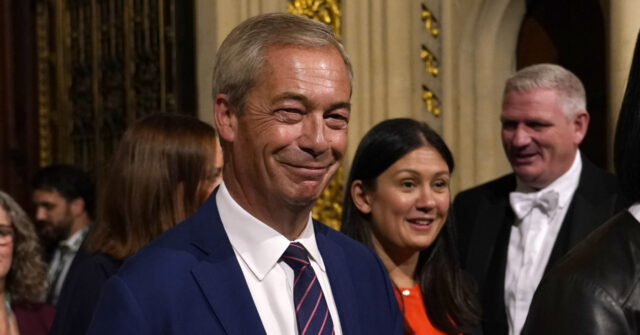In recent developments surrounding the ongoing Channel migrant crisis, prominent Brexit leader Nigel Farage has expressed strong criticism of the French navy’s involvement in escorting migrants, particularly highlighting an incident involving a man named ‘Mada Passa’. This individual, who has gained attention on social media for his content, is alleged to have made death threats against Farage. Following a complaint by the Reform UK party MP, it has been reported that Metropolitan Police officials confirmed the detention of ‘Mada Passa’ by immigration officers for both immigration and criminal offenses. While Farage expressed relief over the detention, he was troubled by the circumstances under which the migrant was escorted to British waters by the French navy, questioning the appropriateness of such an individual being allowed entry into the UK.
‘Mada Passa’, who is distinctive for a tattoo of a Kalashnikov rifle on his face, has become a controversial figure due to his inflammatory content on social media. He broadcast a video depicting himself crossing the English Channel in a dinghy, allegedly escorted by a French government vessel. This has sparked discussions about the role of French authorities in facilitating migrant crossings, a topic that was once dismissed as mere conspiracy theory but which Farage documented in his early coverage of the crisis. The debate surrounding the migrant crisis has intensified, leading to broader public discussions about border security and immigration policy, particularly in light of inconsistent deportation practices in the UK.
The Metropolitan Police’s previous acknowledgment of threats made against Farage on October 18 has added intrigue to the situation. The police have made it clear that they take threats against MPs seriously and are committed to ensuring their safety. Farage has indicated that this recent incident places a spotlight on the challenges faced by lawmakers in addressing rising threats and the associated implications for public safety. It commands a broader context of increasing violence and intimidation as part of the ongoing discourse surrounding migration and the government’s ability to manage it effectively.
In earlier reports, ‘Mada Passa’ was described as an Afghan migrant who had previously resided in Sweden. His rising popularity amid European crackdowns on economic migrants poses questions about the UK’s immigration policies and its perceived leniency compared to other European nations. As neighboring countries tighten their borders, more migrants find their way to the UK, drawn by the prospect of a less stringent immigration environment. This has become a contentious issue, especially with ongoing tensions regarding the treatment of migrants and the implications for national security.
Content from influencers and social media celebrities like ‘Mada Passa’ often blurs the lines of entertainment and reality, further complicating public perception of migrants. In his videos, he has exhibited behavior that many find alarming, including making gun gestures and other violent postures while speaking threateningly towards Farage. Such content can cement negative stereotypes about migrants and exacerbate existing fears within the public. Farage has used this moment to question whether individuals like ‘Mada Passa’ are the type of people the UK should be accepting, urging citizens to reflect on the broader implications of such figures within their communities.
Ultimately, as the UK grapples with the complexities of immigration policies and border control, the incidents surrounding ‘Mada Passa’ and his interactions with Farage highlight deeper societal issues regarding the perception of migrants, national security, and the role of social media in shaping public discourse. The outcry following these events underscores the urgency for a comprehensive approach to immigration that addresses both humanitarian needs and the safety concerns of citizens. As public scrutiny intensifies, the government faces a critical juncture in balancing the twin imperatives of maintaining an open society while ensuring safety and security for its citizens in increasingly polarized discussions.

